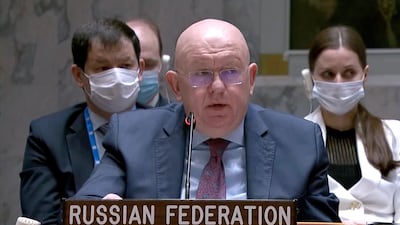Live updates: follow the latest news on Russia-Ukraine
Russia accused the US of funding a potentially catastrophic biological weapons programme in Ukraine on Friday, but the claims were rebuked or ignored by western envoys and UN officials at today's Security Council talks.
Moscow says it has uncovered evidence of the US funding research into the development of biological weapons in Ukraine — claims that have been vehemently denied by both Washington and Kyiv.
The US and Ukraine have countered, saying Moscow’s trumped-up claims were a sign that it could soon use such chemical weapons itself. Russian forces have been accused of using prohibited weapons in Syria.
Russia's UN ambassador Vasily Nebenzya told the council of a network of 30 US-funded laboratories across Ukraine developing deadly variants of the plague, anthrax, cholera, the flu and other diseases that could be spread by birds, bats, lice and fleas.
Advancing Russian forces had discovered documents left behind after a Ukrainian “clean-up” operation detailing the scheme that were now available on Russia’s Ministry of Defence website, he told diplomats in New York.
More details would be presented later at the UN, he said.
“We call upon you to think about a very real biological danger to the people in European countries which can result from an uncontrolled spread of biological agents from Ukraine, which, as we have seen with Covid-19, is impossible to stop,” said Mr Nebenzya.
US ambassador Linda Thomas-Greenfield panned Russia’s claims as “lying and spreading disinformation” and a “false flag operation” to justify Moscow’s deployment of tens of thousands of troops in Ukraine.
“Ukraine does not have a biological weapons programme,” said Ms Thomas-Greenfield.
“There are no Ukrainian biological weapons laboratories supported by the United States, not near Russia's border or anywhere.”
Britain’s UN ambassador Barbara Woodward said Moscow had “sunk to new depths” while France’s UN ambassador Nicolas de Riviere told reporters outside the chamber the claims were “fake news” a “bunch of lies” and a “smokescreen”.
Ukrainian President Volodymyr Zelenskyy in his nightly address to the nation on Thursday denied developing any “weapon of mass destruction” on Ukrainian soil and said Moscow’s claim was a worrying portent.
“If you want to know Russia’s plans, they are what Russia accuses others of,” he said.
The 15-nation body met at the request of Russia to discuss the alleged development of biological weapons in Ukraine, and was briefed by UN disarmament chief Izumi Nakamitsu and UN political chief Rosemary DiCarlo.
Ms Nakamitsu said she was “not aware of any biological weapons programmes” in Ukraine.
Ms DiCarlo made no mention of Moscow’s claims of biological labs, instead raising “credible reports” of Russian forces using banned cluster munitions in populated areas and the deaths of at least 564 civilians.
The shelling of residential areas of Mariupol, Kharkiv, Sumy and Chernihiv was “particularly alarming”, said Ms DiCarlo.
“The utter devastation being visited on these cities is horrific,” she added.
Moscow in 2018 accused Washington of secretly carrying out biological weapons tests in a laboratory in Georgia, another former Soviet republic that, like Ukraine, seeks to join Nato and the EU.
Council members met against a backdrop of violence in Ukraine, with the cities of Lutsk, Ivano-Frankivsk, Dnipro being struck in a widening of Russia’s offensive in the country, which began on February 24.
The UN agency for refugees on Friday said 2.5 million people have fled Ukraine, about two million have been displaced within its borders and another 12.65 million were “directly affected” by the spiralling conflict.
Aid workers were struggling to assist the besieged residents of the frontline cities of Mariupol and Kharkiv, where everything from food to water, medicine, blankets, fuel and generators were “urgently needed”, said the agency.











































